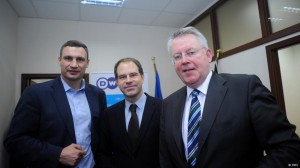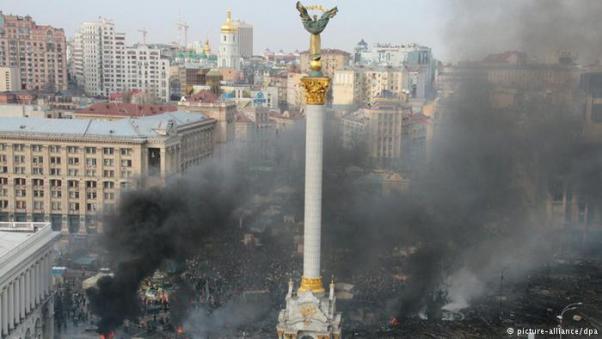Search Results for Tag: Ukraine
Meet the Maidan generation on DW
 On the new documentary Maidan Dreaming, DW gives the world a unique look beneath the surface of life in Kyiv through the eyes of young people who are driving the fashion and electronic music scene. By exploring art, music and culture, the documentary provides a close-up look at the Maidan generation.
On the new documentary Maidan Dreaming, DW gives the world a unique look beneath the surface of life in Kyiv through the eyes of young people who are driving the fashion and electronic music scene. By exploring art, music and culture, the documentary provides a close-up look at the Maidan generation.
Life in the Ukrainian capital Kyiv is symbolized by contrasts – whether it is between rich and poor, tensions between Russia and the West, or between the past and the future. The uprising in 2014 permanently changed life in Ukraine. How is life progressing after more than a year of transformation and conflict?
The film follows the organizers of Cxema, an electronic music rave in Kyiv. Through the lens of Cxema rave, the documentary exposes the thoughts and feelings young people in Ukraine have about their country and their expectations for the future.
The result is a unique perspective on the dynamics that are driving divisions in Ukrainian society and a personal look at what it means to be young in Kyiv. Electronic music, art and a sense of community are all something that bring young people together amidst the tension and turmoil that is shaping their lives. Also featured in the film is a Ukrainian fashion label, Syndicate, which is a growing trend among creative people in Kyiv and is growing in popularity around Europe and Russia.
These young people are pursuing their dreams in a society that has been shaken to its core and is being pulled by geopolitical tension. With each other and through art, music and culture, they are finding a way to make their dreams a reality.
Maidan Dreaming is another example of DW sharing important stories with people around the world. The film was shot last summer by a DW crew in Kyiv and is being broadcast on DW starting on Saturday, November 19. It is available online in English, German, Spanish, Arabic, Ukrainian and Russian.
Ensuring viewers get the big picture in Russia and Ukraine
What does the Russian information war mean for the news industry? International media play a major role in forming the narrative on the conflict between Russia and Ukraine – and polarization is increasing as opposing sides try to take the lead in covering events for people living in affected regions.
DW prides itself on providing a unbiased voice to the media landscape. And to ensure that even more people can benefit from fair and balanced news and information, DW is producing two new 10-minute news formats in Russian and Ukrainian. From Monday to Friday, DW Nowosti and DW Nowyny provide audiences with news coverage on regional and European issues that they won’t find elsewhere with the support of local Russian and Ukrainian correspondents.
Broadcasting partners of DW Nowosti are currently TV Rain in Russia, LRT in Lithuania, Yerkir Media in Armenia, GPB 2 in Georgia and YES TV in Israel. There are on-going negotiations to include more partners soon. All broadcasts of both formats are always available online.
Across the spectrum of issues, there is bias and a need for objective information. Since the beginning of the current conflict in Ukraine, DW has provided a third perspective that can help people get the big picture. Geofaktor, DW’s news magazine for the region has been on air since January 2014. This information conflict looks likely to continue into the near future and DW will continue to provide a standard of journalism that everyone can count on.
Russian media outlets are afflicted by a lack of objectivity – especially when reporting on events in Ukraine and eastern Europe. In a context that is packaged as professional journalism, innuendo, half-truths and outright lies can be propagated without any measure of veracity.
Media outlets from the “west” that take a hawkish stance on reporting Russian affairs tend to exacerbate the problem and can lend credibility to the assertions of Kremlin-controlled media. The best approach to address the tangled web of information coming out of Russian news outlets is to continue producing steady, solid and serious news reporting that maintains the core principles of journalism.
An important step to establishing fair and balanced coverage
At the end of 2013, DW recognized that the political tension in Kiev, Ukraine was something that deserved closer attention. DW reporters were on location at the Maidan when it was becoming clear that things were more serious than just public protest. In January 2014, as the situation escalated precipitously, DW released Geofaktor – a Ukrainian-language news magazine that provided a fresh perspective in what was quickly becoming an arena of misinformation.
DW remained a consistent and stable source of information as what began as a protest movement disintegrated into a geopolitical conflict with Russia at the center seeming to steer the region into chaos.
The latest step in DW’s commitment to covering Ukraine is the addition in January of a news bureau in Kiev run by DW correspondent Frank Hofmann. This expansion comes at a critical time just as the conflict in eastern Ukraine is reaching a new phase of escalation.
Coinciding with military conflict in Ukraine is a persistent and aggressive information war from Russia, which is being waged against “pro-western” media coverage. The Kremlin is pouring a lot of resources into a comprehensive international media strategy. The newly-released international online news and radio service Sputnik is at the heart of this. In Kiev alone, Sputnik is said to have a staff of 100.

Kiev’s Mayor Vitali Klitschko, DW correspondent Frank Hofmann and DW Director General Peter Limbourg
The importance of independent, objective international news like DW becomes all the more important in the fight against the flood of biased news outlets. Built on a tradition of objectivity, integrity and accuracy, international audiences can trust that the reports coming from DW’s Kiev bureau represent the highest standard of news.
Market roundup: January 2015
Online
DW news in 12 languages are included in the newly-launched MSN news apps. This makes online content from DW not only available on all Windows mobile handsets and msn.com, but also expands the reach to iOS and Android devices.
Asia
Onneshon is now available in India and Bangladesh. The science show that is broadcast in Bengali will be made available in Eastern India on Doordarshan Bangla (DD Bangla).
Europe
A weekly version of Euromaxx is now being produced and broadcast in Ukrainian. The new adaptation of the classic show is being produced in cooperation with ZIK-TV, with which DW has been working with since the beginning of 2014. ZIK-TV also rebroadcasts Geofaktor and Focus on Europe.
South America
The culture magazine Camorote.21 is now being broadcast nationwide in Brazil by TV Brasil. The public broadcaster is part of the EBC (Empresa brasileira de comunicação) and focuses on informational and cultural programming.
A clear voice in a war of words
Ingo Mannteufel, Head of Russian and Eurasian Services at DW
The current conflict in eastern Ukraine is being played out as much on the front pages and primetime newscasts as it is on the ground in the affected areas. Misinformation coming from Eastern Ukraine is rampant and events become confused as both sides attempt to control the narrative.
Responsible journalism does not contribute to a single agenda or fan the flames of public animosity. In the case of Ukraine, the role of the impartial observer becomes integral in presenting a sober and realistic assessment of the facts aside from jingoistic nationalism or the fog of war. What is said becomes critical in a situation where words are being used as ammunition.
Getting the facts straight in a conflict zone can be a daunting task. In Eastern Ukraine, reporters on the ground have been threatened, accused of telling lies and even imprisoned by pro-Russian separatists. There is a clear and present atmosphere of media control. The United Nations has already called for action against propaganda and misinformation in Ukraine illustrating the need for a reliable point of view.
As an international media outlet with coverage in Russian and Ukrainian, DW can play a very unique role as an impartial broker of information that provides an unbiased presentation of events directly to those affected. Delivering impartial news and analysis is however a big challenge. While neutrality is a fundamental principle of good journalism, certain information will always take precedence. To compensate for this, we always try and provide a wide range of perspectives.
At DW we have seen the numbers of people using our Russian and Ukrainian news services rise dramatically as the situation continues to escalate. This demonstrates a direct demand for the services of third party media organizations. As the conflict in the region goes on, the truth will only become more unclear. That’s why we feel it is the duty of international broadcasters, like ourselves, to step in and make sure that all facets of the stories are being told – to ensure that everyone can build their own opinions.
Follow me on Twitter for more news and analysis on the situation in Ukraine










Feedback